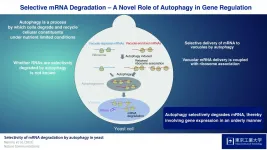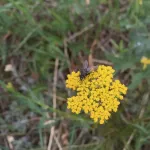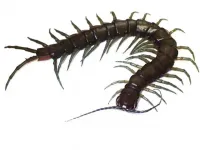Selective mRNA degradation via autophagy: A novel role for autophagy in gene regulation
2021-04-19
(Press-News.org) Optimal cell function requires a fine balance between the synthesis and degradation of biomolecules. Autophagy is the process by which cells degrade and recycle their own components, helping to clean up and maintain the cell's internal environment and ensure the smooth functioning of cellular processes. Autophagy is strongly induced when cells are subjected to stresses like nutrient deprivation, acting under such conditions to supply nutrients through its breakdown of unneeded cellular material.
Autophagy substrates are delivered to vacuoles in yeast or lysosomes in mammals for degradation by double-membrane vesicles called "autophagosomes". While autophagy was originally considered a non-selective process that isolates substrates in the cytoplasm of the cell in a random manner, studies have reported that certain cellular components, such as a subset of proteins and damaged or superfluous cell organelles, are isolated in a selective manner. In contrast to this well-established targeting of organelles and proteins by autophagy, the question of whether RNAs are subjected to autophagy and if they are selectively degraded has remained unanswered.
In their latest study, which was published in Nature Communications, researchers from the Tokyo Tech and RIKEN conducted a detailed analysis of the preferential degradation by autophagy of messenger RNAs (mRNAs), which contain the information required to make cellular protein and bind ribosomes for protein synthesis. Corresponding author Prof. Yoshinori Ohsumi of the Tokyo Tech, who was awarded the 2016 Nobel Prize in Physiology or Medicine for his pioneering work in the field of autophagy, explained the group's findings, stating "We have previously shown that RNA delivered to the vacuole via autophagy in yeast cells, where it is degraded by vacuolar nucleases. The question of whether RNA degradation by autophagy occurs preferentially, however, remains unaddressed. This difficult to address question was the starting point of this project."
As RNAs that accumulate in the vacuole are enzymatically degraded by the nuclease Rny1, they first constructed a yeast strain lacking this enzyme. Using this strain, they were able to isolate and identify RNAs that accumulated in the vacuole. Next, they used the drug rapamycin, which is known to induce autophagy, to assess unique features of mRNA species delivered to the vacuole in Rny1-deficient cells when autophagy is induced. Critically, they discovered that autophagy-mediated mRNA delivery to vacuoles is selective, not random, in nature.
The researchers then characterized the different mRNA species by conducting a broad analysis of the types of mRNAs in these cells, identifying 'vacuole-enriched' and 'vacuole-depleted' mRNAs. Interestingly, housekeeping mRNAs, such as those encoding proteins involved in amino acid biosynthesis, were most likely to be delivered to vacuoles. In contrast, mRNAs required for the synthesis of proteins with regulatory functions, such as protein kinases, were predominantly detected in the vacuole-depleted mRNA fraction.
Furthermore, they demonstrated that mRNAs undergoing translation are delivered to the vacuole, which is suggested to be a translation-dependent process. Moreover, persistent ribosome-mRNA association upon rapamycin treatment was found to be a key determinant of vacuolar mRNA delivery during autophagy-mediated degradation.
Dr. Makino and Prof. Ohsumi highlighted the importance of autophagy in gene regulation, remarking, "Our findings suggest that autophagy regulates mRNA degradation at the translation step, thereby enabling a rapid and sensitive switch from ribosome-associated mRNAs to expression of mRNAs that are essential for an effective response to stress. Preferential degradation of ribosome-mRNAs by autophagy is therefore very likely to determine the fate of individual mRNAs as cells adapt to new conditions."
INFORMATION:
[Attachments] See images for this press release:

ELSE PRESS RELEASES FROM THIS DATE:
2021-04-19
With alarms sounding about the declining diversity of plants and animals, a related concern with equally profound implications is posed: is the variety of microbial life, including viruses, changing too -- and if so, in which direction and how fast?
In a paper published today, David S. Thaler of the University of Basel, Switzerland, and Guest Investigator at The Rockefeller University's Programme for the Human Environment (PHE), notes the well-documented, "clearly downwards" trajectory of plant and animal diversity, constituting "a key issue of the Anthropocene."
Whether change is underway also in the world of microbes -- the tiniest cogs in planetary functioning -- is "a complete unknown. We have no idea whether global microbial diversity is increasing, decreasing, or staying ...
2021-04-19
Anyone sexually active under age 30 should be offered testing for chlamydia and gonorrhea, according to a new guideline from the Canadian Task Force on Preventive Health Care published in CMAJ (Canadian Medical Association Journal).
Chlamydia and gonorrhea are the most commonly reported sexually transmitted bacterial infections (STIs) in Canada and are treatable with antibiotics. Without treatment, these infections can lead to pelvic inflammatory disease, pain and possibly infertility.
"If people are under 30 and sexually active, it's a good idea to get tested," says Dr. Ainsley Moore, a family physician and associate clinical professor, Department of Family Medicine, McMaster University, and chair of the task force chlamydia ...
2021-04-19
Videoconferences may be less exhausting if participants feel some sense of group belonging, according to new research published by the American Psychological Association.
As remote work and the use of videoconferences have dramatically increased during the coronavirus pandemic, more people are fatigued from meeting through computer screens instead of in person. In this study, 55 employees in various fields in the United States were surveyed about their feelings about videoconferences. The researchers thought longer meetings and being on video would cause the most fatigue, but their findings surprised them, said lead researcher Andrew Bennett, PhD, an assistant professor at Old Dominion University.
"We expected that aspects of being on video would be related to fatigue, such ...
2021-04-19
The next time you go for a hike, take an extra moment to appreciate the seemingly ordinary life all around you. A house fly, humble yarrow weed and other "generalist" plants and pollinators play a crucial role in maintaining biodiversity and may also serve as buffers against some impacts of climate change, finds new University of Colorado Boulder research.
The findings, published this month in Ecology, provide valuable insights for prioritizing the conservation of species that contribute to the strength of ecological communities.
"A lot of times, conservation efforts are geared toward things that are rare. But oftentimes, species that are common are also in decline and could go extinct, and that could have really big repercussions for maintaining biodiversity," ...
2021-04-19
New research is shining light on the importance of farmers' markets' ability to mitigate potential disruptions to distribution networks in the face of system shocks like the COVID-19 pandemic.
In a recent study, the researchers found the markets' regional characteristics play a key role in the decision to move all or parts of their operations online -- and how that decision can help or hinder its surrounding community.
"By building online communities through their social media and website tools, farmers' markets can play a role in keeping the community connected and supporting a sustainable and just food system through the pandemic and beyond," said researcher Josalyn Radcliffe, a PhD student in Waterloo's School of Public Health and ...
2021-04-17
Sophia Antipolis - 17 April 2021: Elevated blood pressure, high cholesterol and diabetes increase the risk of heart disease. But a large study today reveals that in people with these conditions, increasing activity levels is associated with a reduced likelihood of heart events and mortality. The research is presented at ESC Preventive Cardiology 2021, an online scientific congress of the European Society of Cardiology (ESC).1
Study author Dr. Esmée Bakker of Radboud University Medical Center, Nijmegen, the Netherlands said: "Previous research showed that improvements in physical activity are beneficial to health. However, those studies were performed in the general population. In our study, we were interested to see if there were similar effects in individuals with cardiovascular ...
2021-04-17
Tokyo, Japan - Researchers from Tokyo Metropolitan University and Hosei University have discovered a new species of large, tropical centipede of genus Scolopendra in Okinawa and Taiwan. It is only the third amphibious centipede identified in the world, and is the largest in the region, 20 cm long and nearly 2 cm thick. It is also the first new centipede to be identified in Japan in 143 years, testament to the incredible biodiversity of the Ryukyu Archipelago.
Scolopendra is a genus of large, tropical centipede, one of the original genera named by the father of modern taxonomy himself, Carl Linnaeus. They are strong predators in any soil ecosystems they inhabit, with around 100 different species found in tropical regions around the world. Of these, only five have been ...
2021-04-16
Research shows that a new telescope could detect a potential signature of life on other planets in as little as 60 hours.
"What really surprised me about the results is that we may realistically find signs of life on other planets in the next 5 to 10 years," said Caprice Phillips, a graduate student at The Ohio State University, who will share preliminary findings at a END ...
2021-04-16
From engineered pandemics to city-toppling cyber attacks to nuclear annihilation, life on Earth could radically change, and soon. Scientists will forecast the fate of the planet at a END ...
2021-04-16
Tarantulas are among the most notorious spiders, due in part to their size, vibrant colors and prevalence throughout the world. But one thing most people don't know is that tarantulas are homebodies. Females and their young rarely leave their burrows and only mature males will wander to seek out a mate. How then did such a sedentary spider come to inhabit six out of seven continents?
An international team of researchers, including Carnegie Mellon University's Saoirse Foley, set out on an ancestry.com-like investigation to find the answer to this question. They looked to the transcriptomes, ...
LAST 30 PRESS RELEASES:
[Press-News.org] Selective mRNA degradation via autophagy: A novel role for autophagy in gene regulation





